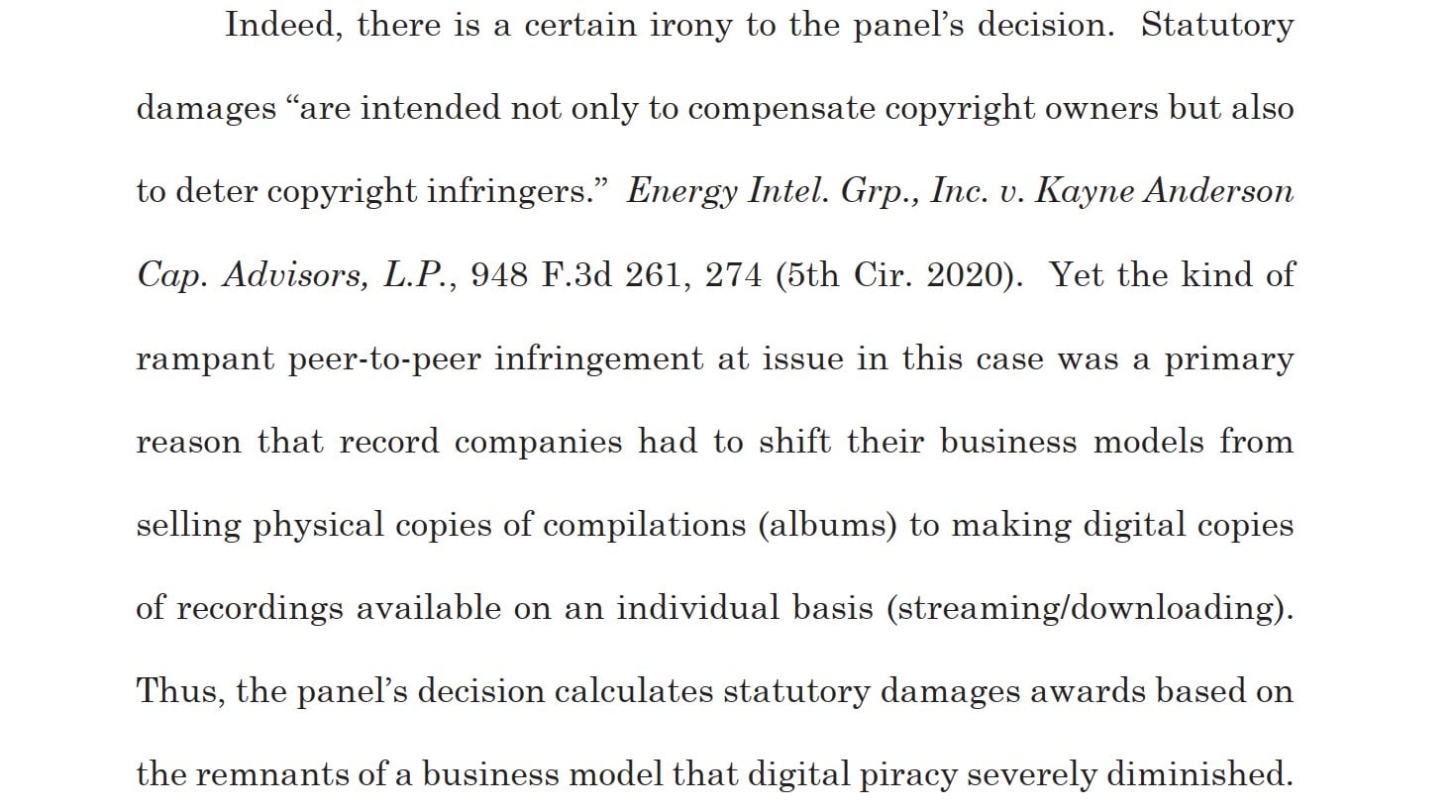 In late 2022, several of the world’s largest music companies including UMG, Warner and Sony Music prevailed in their lawsuit against Internet provider Grande Communications.
In late 2022, several of the world’s largest music companies including UMG, Warner and Sony Music prevailed in their lawsuit against Internet provider Grande Communications.
The record labels accused the Astound-owned ISP of not doing enough to stop pirating subscribers. Specifically, they alleged that the company failed to terminate repeat infringers.
The trial lasted more than two weeks and ended in a resounding victory for the labels. A Texas federal jury found Grande guilty of willful contributory copyright infringement, and the ISP was ordered to pay $47 million in damages to the record labels.
$47 Million Appeal
Grande was unhappy with the verdict and appealed. Internet providers shouldn’t be held liable for pirating customers based on third-party allegations, the company noted. This appeal was supported by several telecoms organizations which agreed that terminating accounts of suspected pirates is a drastic and overbroad remedy.
In addition to the liability aspect, Grande also protested the damages calculations. The jury calculated the damages per song, instead of per album, which is the wrong interpretation of U.S. law according to the ISP.
Last month, the Fifth Circuit Court of Appeals handed down a mixed order. The court confirmed that the ISP is liable for copyright infringement but upheld its concerns over damages. A new trial was issued to establish the lower damages award, on a per-album basis.
The Court agreed that, in this instance, awarding statutory damages on a per-song basis “would make a total mockery” of Congress’ mandate. If rightsholders would like this to change, they should ask Congress to change the law.
Record Labels Want Rehearing
UMG, Warner, Sony and the other labels agree with the finding on liability but object to the damages calculation since this substantially lowers the $47m award.
Last week, they filed a petition for a rehearing en banc. They argue that the Fifth Circuit’s decision on the damages’ calculation is too narrow.
The labels note that each song that was infringed is its own “work” under the Copyright Act, and that they are entitled to damages for each individual song.
Their argument is based on the “independent economic value” test, which asks whether the unit of expression has “independent economic value” to the copyright owner. If it does, then the copyright owner is entitled to statutory damages for the infringement of each copyrightable unit of expression.
In this case, songs can have individual value, whether they are part of an album or not. This notion is supported by the fact that most music is consumed via digital streaming platforms, which provide access to individual songs.
“In the digital era, streaming is the primary source of revenue and necessarily involves the commercialization of individual recordings,” the labels write.
Piracy Changed the Music Biz
The labels point out that there’s a certain irony in the Fifth Circuit’s decision. They note that rampant piracy was a primary reason the industry moved from selling physical albums to making individual downloads and streams available.
This means that statutory damages, which are supposed to compensate copyright owners and deter infringers, are based on the old “album” model, which has been disrupted by online piracy.
“Thus, the panel’s decision calculates statutory damages awards based on the remnants of a business model that digital piracy severely diminished,” the petition reads.

One Work?
In addition to the independent economic value test, the labels disagree with the court’s interpretation of Section 504(c)(1) of the Copyright Act, which states that all parts of a compilation constitute one work.
The Fifth Circuit held that albums are compilations, which should therefore be seen as a single work. However, the labels believe that this narrow interpretation only applies if the alleged copyright infringement is an album.
In this case, the labels alleged infringements of individual songs, not albums. Therefore, it should be appropriate to calculate damages per song, they argue.
“Thus, the panel’s rule serves no purpose other than to punish copyright owners for their decision to include their standalone works on compilations in addition to commercializing them individually,” the labels write.
This present lawsuit is based on alleged BitTorrent downloads. It’s not immediately clear whether these were only torrents for individual songs. However, the labels seem to suggest this is the case.
All in all, the music companies argue that there is sufficient reason for a rehearing. If the current verdict stands it will significantly harm their ability to combat rampant online piracy, they conclude.
—
A copy of the petition for a rehearing en banc, which was submitted at the Fifth Circuit Court of Appeals last week, is available here (pdf).
From: TF, for the latest news on copyright battles, piracy and more.
Powered by WPeMatico
